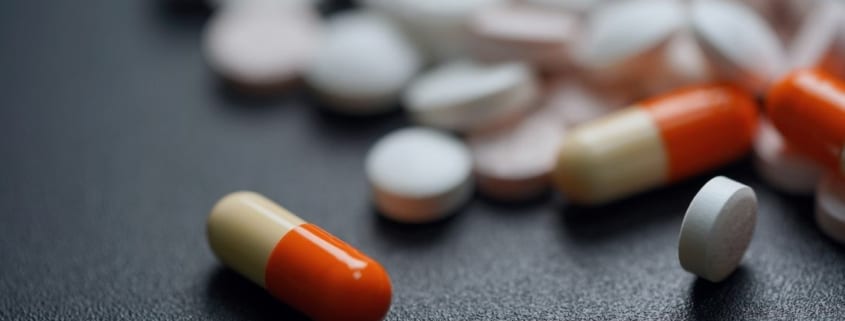5 Medications to Avoid If You’re Sober
According to the Substance Abuse and Mental Health Services Administration (SAMHSA), 48.7 million people struggled with addiction in 2022.
When you get sober there are a lot of new things you’ll have to adjust to. Instead of going out with friends to bars every weekend, you’ll have to look for sober-friendly activities to have fun. Additionally, there are some things you will have to avoid to ensure you maintain your sobriety.
One of the many things you will need to adjust to is deciding what medications are safe to take as a sober individual. Unfortunately, many prescription and over-the-counter medications could trigger your substance use disorder. For example, you should avoid taking medications like opioids or stimulants, which are known to be habit-forming and addictive.
Being aware of what medications to avoid in recovery will help you navigate your life as a sober individual. Avoiding certain substances will prevent you from experiencing an unnecessary relapse. You should never take opioids, benzodiazepines, sedatives, stimulants, and over-the-counter (OTC) medications that contain alcohol.
5 Medications You Shouldn’t Take if You’re Sober
Certain medications are known to be habit-forming, which means you should steer clear of them if you are a recovering addict or alcoholic.
1. Opioids
Opioids are one of the most addictive types of medications out there. Doctors prescribe them to treat pain, usually on a short-term basis. Even though opioids are effective pain medications, you should avoid taking them.
Examples of opioid medications include:
- Hydrocodone
- Oxycodone
- Codeine
- Morphine
- Hydromorphone
- Fentanyl
Instead of taking an opioid for pain, you could ask for a non-addictive alternative. Examples of replacements for opioids include acetaminophen and non-steroidal anti-inflammatory drugs (NSAIDs). These medications can provide pain relief without running the risk of addiction.
2. Benzodiazepines
Benzodiazepines are a class of drugs that depress the central nervous system. They also calm down abnormal activity in your brain. Because of their effects, they are often used to treat anxiety, panic attacks, and seizure disorders.
You should avoid taking benzodiazepines because they can be incredibly addictive. Abusing them might produce a drowsy and euphoric effect, causing you to get stuck in a cycle of addiction once again.
Examples of benzodiazepines include:
- Xanax (alprazolam)
- Klonopin (clonazepam)
- Valium (diazepam)
- Ativan (lorazepam)
- Librium (chlordiazepoxide)
- Tranxene (clorazepate)
- Paxipam (halazepam)
- Serax (oxazepam)
- Centrax (prazepam)
- Doral (quazepam)
You should talk to your doctor about your history of addiction if they suggest taking a benzodiazepine. They should be able to find a non-addictive alternative that will work to treat your symptoms.
3. Sedatives
Sedative hypnotics are usually prescribed to treat insomnia on a short-term basis. They might also be referred to as sleeping pills or tranquilizers. If you are having trouble sleeping, your doctor might suggest a sedative.
Unfortunately, many sedatives are also addictive. This is one of the reasons doctors only prescribe them for a short time. As a result, you should avoid taking a sedative when you are in recovery from addiction.
Examples of sedative medications include:
- Ambien (zolpidem)
- Belsomra (suvorexant)
- Butisol (butabarbital)
- Dayvigo (lemborexant)
- Halcion (triazolam)
- Hetlioz (tasimelteon)
- Lunesta (eszopiclone)
- Quviviq (daridorexant)
- Restoril (temazepam)
- Rozerem (ramelteon)
- Seconal (secobarbital)
- Silenor (doxepin)
- Sonata (zaleplon)
Thankfully, there are alternatives to sedatives for treating insomnia. Your doctor can help you find non-addictive prescription drugs to assist you in your sleeping habits. For example, many antidepressants help manage insomnia without causing habit-forming effects.
If you are taking a sedative, it is important to note that your medication interacts with alcohol. Drinking on a sedative could become life-threatening, leading to fatal overdoses and liver damage. You should always check the interactions between alcohol and medications before drinking.
4. Stimulants
If you have attention-deficit hyperactivity disorder (ADHD), you might treat it with prescription stimulants. It is important to note that stimulants can be addictive and habit-forming when misused. You and your therapist can decide whether the benefits of the medication outweigh the risks of addiction.
If you do not have ADHD, you should never take stimulants while you are in recovery from an addiction. Abusing these medications will cause you to experience increased energy and euphoria, which can quickly lead to an addiction.
Examples of stimulant drugs to avoid include:
- Adderall
- Concerta
- Ritalin
- Dexedrine
- Vyvanse
- Desoxyn
There are alternatives to stimulants for treating ADHD. For example, many people with the condition have found success using a non-stimulant medication called Strattera. Consult with your doctor to determine if this medication is right for you.
5. Medications Containing Alcohol
Lastly, several common medications have alcohol in them. For example, cough syrups often contain a certain amount of alcohol. If you drink these while in recovery, you could trigger your substance use disorder and end up relapsing.
Most of the over-the-counter medications that contain alcohol are liquid cold, cough, or allergy medications. However, some vitamins and mouthwash also contain alcohol. When you are picking up liquid solutions that you consume at the store, make sure to check the ingredients label to make sure you are not drinking alcohol.
Find Help in Recovery
Whether you are taking prescription medications or OTC drugs, you should be careful when you are sober. Unfortunately, taking specific medications like opioids or sedatives could lead to a relapse. Thankfully, sober living programs are here to help you stay on track.
If you require support during the early stages of your recovery, you should consider a sober living housing program. Contact New You Sober Living for more information on how we can help.




Leave a Reply
Want to join the discussion?Feel free to contribute!